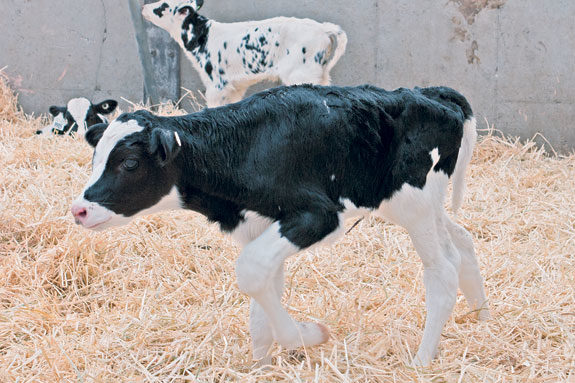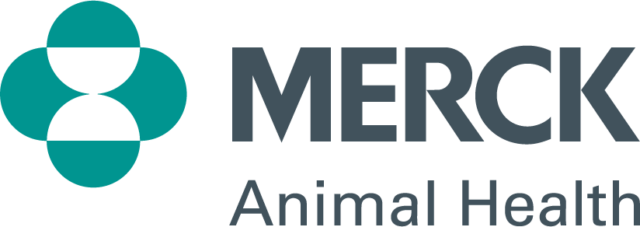As summer fades to a close, take steps to help prevent the costly effects of bovine respiratory disease (BRD). Changing weather conditions can create respiratory challenges for calves. Cooling temperatures in fall and big temperature swings between day and night can lead to stress on calves’ immune systems. Colder weather requires closing windows and doors of calf housing, creating an environment at more risk for improper ventilation, minimized air exchange and, potentially, a buildup of BRD-causing pathogens – all contributing to a utopia for BRD infections.
BRSV spreads as easily as the common cold
One of the causes of BRD is bovine respiratory syncytial virus (BRSV). An omnipresent pathogen, BRSV is common to calves – it can affect up to 70 percent of dairies. And it’s just as easy for calves to acquire BRSV from infected penmates and environmental surfaces on the farm as it is for humans to pick up cold germs on shopping carts.
BRSV spreads quickly after entering the nasal cavity and infects the upper and lower respiratory tracts. The virus infects the mucosal cells lining the respiratory tract and destroys the protective tissue in the airways. This leaves the underlying tissue vulnerable to other viral infections and secondary bacterial infections.
Disease caused by BRSV is prevalent in young dairy cattle. Calves have a greater chance of developing an infection during high-stress times, such as weaning or moving to group housing. While respiratory diseases occur most often during such events, calves can be exposed to viruses earlier.
Research shows that not only are calves affected with BRD in the first few months of life more likely to die, but those who do survive have reduced average daily gain, calve later than unaffected herdmates and produce less milk in at least their first lactation, putting your dairy’s future at risk.
Vaccinate to help prevent BRSV
Young calves need help defending themselves from BRSV and other BRD pathogens. While maternal antibodies present in colostrum help fight diseases, they also can interfere with the immune response to some vaccinations.
However, a trial tested the response of 1-day-old to 14-day-old calves to an intranasal respiratory vaccine (INFORCE 3) and the results showed that the vaccine helps override maternal antibodies present in colostrum and primes a calf’s immune system.
Calves that received the vaccine had a 57 percent reduction in lung lesions and 70 percent less mortality than the control group of calves following challenge with BRSV.
Boost immunity before commingling
As part of a comprehensive vaccination program, producers should work with their veterinarian to determine when to schedule revaccination to help maintain protection against BRD during commingling.
Revaccination is especially important for young calves facing high-risk situations, such as movement to group housing, where stress is increased, exposure to pathogens is higher and increased sickness is, therefore, more likely.
Immunity beyond vaccination
Help ensure a strong immunity through complete calf and heifer management. Managing the environment and housing makes a difference in building your calves’ immune systems. Space management is a key part of group housing. All calves in group housing should have ample resting and eating space.
Cramped conditions create unneeded competition for comfortable resting space and disrupt feed intake when the feedbunk is crowded. Added stress can undermine the immune system and make calves more susceptible to disease.
Air quality is equally important to a healthy living environment. Proper ventilation requires a constant exchange of dirty air indoors with the fresh air outside. Removing dirty air is necessary to minimize airborne pathogens and eliminate harmful odors.
While drawing in fresh air is important, you also need to ensure calves are protected from drafts from fall’s cooler air. Take steps to help protect your calves against BRD this fall and maximize the productivity of your herd. PD
References omitted due to space but are available upon request. Click here to email an editor.

Greg Edwards Dairy Technical Services
Pfizer Animal Health
Feed their immune systems to get the most from vaccines
Vaccines play a crucial role in helping protect calves from diseases; nutrition also is a factor in their health. Speak with your veterinarian about implementing these tips to jump-start calves’ immune systems:
• Feed calves high-quality colostrum within the first few hours of life to help provide protective antibodies.
• Give an initial intranasal vaccination at birth to help build a strong immunity against BRSV.
• Provide pre-weaned calves enough calories and protein to at least double birth weight by 60 days old. Offer milk replacer or pasteurized whole milk and a balanced starter.
• Feed calves based on individual size and weight. Adjust feeding based on outside climate.
• Be consistent with rations and feed at the same time each day. If changes are necessary in diet or feeding time, do so gradually.
• Revaccinate calves before moving to group housing.






